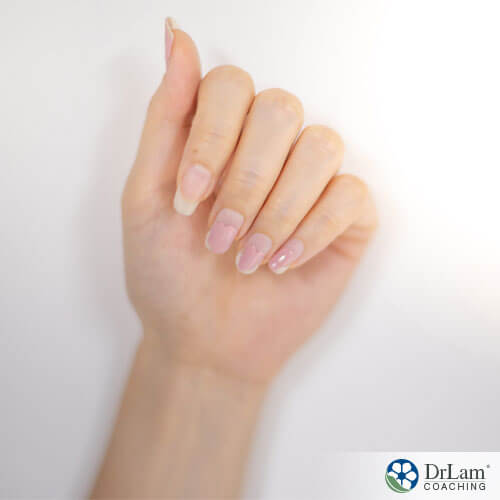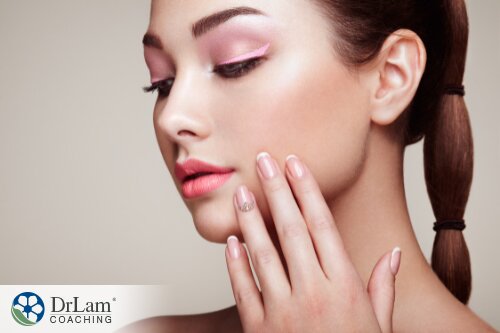 Biotin, sometimes referred to as vitamin B7 or vitamin H, is an essential B complex vitamin. Essential nutrients are those that your body can’t synthesize and so you must take in through food or supplement (although there is something to be said about its production by the gut’s microbiome, which we’ll get to later).
Biotin, sometimes referred to as vitamin B7 or vitamin H, is an essential B complex vitamin. Essential nutrients are those that your body can’t synthesize and so you must take in through food or supplement (although there is something to be said about its production by the gut’s microbiome, which we’ll get to later).
Biotin is most famous as a vitamin for hair growth, although it’s purported to also help with skin and nails as well. That’s why it is usually one of the main ingredients in hair, skin, and nail supplements and products.
But should everyone take it? Do you even need it at all? Can it be harmful if overdone? And, are there any other health benefits of biotin?
Those are the questions we’ll be looking at in this article. But first, we like to take a deeper look at what might cause hair, skin, and nail issues in the first place. Because without addressing the root cause, biotin will just attempt to remedy the symptom. And only temporarily.
Generally speaking, the appearance and texture of your hair, skin, and nails are genetically predetermined. But the state of their health changes, which can also affect their appearance. In fact, hair, skin, and nails are pretty good indicators of how things are going on an internal level. So, if you’ve noticed hair loss or breakage, brittle or splitting nails, dull skin or rashes, you might need to take a look under the hood, so to speak.
The health of your hair depends heavily on your hormones. And hormonal imbalances, such as adrenal fatigue, thyroid problems, or issues with your Ovarian Adrenal Thyroid (OAT) axis, can show up very quickly in the state of your hair. But these hormonal imbalances don’t just come out of nowhere, they have root causes themselves. And if you want to fix your hair issues, you have to address these causes.
Dysregulation of your NeuroEndoMetabolic (NEM) Stress Response, which your Hormone Circuit is a part of, can happen thanks to a variety of stressors. Those can be physical, such as eating a bad diet, being exposed to toxins, taking certain medications, not sleeping well, or getting recurring infections. Or they can be psychological, such as work pressure, family problems, or an unresolved mental health issue.
The common denominator is that the stress is chronic. And it makes your adrenal glands overwork to produce cortisol, your body’s main anti-stress hormone. But as your adrenals get exhausted from all of this work, their cortisol output dysregulates, causing imbalances in the rest of your Hormone Circuit.
Very closely tied to the Hormone Circuit is your Bioenergetics Circuit, the one that deals with how your body uses and produces energy. Basically, your metabolism. It’s composed of your pancreas, thyroid, and liver.
Since biotin is needed for the functioning of carboxylases, which are enzymes that take part in energy production and other metabolic processes, that means biotin is important for good metabolism. And it means that your Bioenergetics Circuit needs it to function properly.
Your body gets energy from breaking down the food you eat. And that happens through the action of enzymes. Some of these enzymes are involved in breaking down carbohydrates, some in breaking down fats, and some in breaking down proteins. And biotin supports enzymes involved in all three.
For example, it helps your body synthesize glucose from non-carbohydrate sources, such as amino acids. This is a process called gluconeogenesis, and it’s basically the conversion of protein or fat into sugar that can then later be used to produce energy. More specifically, it supports the enzymes that break down specific amino acids, like leucine. Biotin also helps your body synthesize fatty acids, again, by helping the enzymes that activate that reaction.
But there is no recommended daily allowance (RDA) for this vitamin. And the estimated adequate intake for adults, including pregnant women, is 30 mcg per day. For breastfeeding moms, it’s 35 mcg per day. And you can get this amount easily from food, such as:
But what about supplements? What can they do for your health, exactly?
At this point, there aren’t enough scientific studies that show taking a biotin supplement can help stop or reverse hair loss or make your hair grow faster. But it’s still used in many hair shampoos, conditioners, creams, and vitamins. And, many people swear by its effectiveness.
 The same goes for brittle or weak nails. No studies show taking extra biotin can help make your nails stronger or longer. As for skin, it seems that supplements may help with rashes and redness, but only if there is a deficiency to begin with.
The same goes for brittle or weak nails. No studies show taking extra biotin can help make your nails stronger or longer. As for skin, it seems that supplements may help with rashes and redness, but only if there is a deficiency to begin with.
Biotin deficiency is usually asymptomatic, but in the instances where you do experience symptoms, they can include:
Unless you have an actual biotin deficiency, there may be no need to supplement at all. And, since biotin deficiency is rare, it’s not something to worry about too much. It's usually confined to those who consume a lot of raw eggs (raw eggs contain the protein avidin which binds to biotin and makes it less bioavailable), those who drink a lot of alcohol, and pregnant and lactating mothers.
Although your body doesn’t produce biotin itself, your gut bacteria, or your microbiome, actually can. But only if it’s healthy and in balance, which for many people, is not the case. Those with dysbiosis, where the good bacteria are outnumbered by the bad bacteria, may end up with biotin deficiency as well. And this dysbiosis can happen thanks to the use of antibiotics, eating a bad diet, or consuming too much alcohol.
Your gut microbiome is part of your NEM’s Inflammation and Neuroaffect Circuits. And it makes sense, as inflammation that begins in the gut can travel to other areas of your body. Inflammation that reaches your skin can cause skin flare-ups, and inflammation that reaches your central nervous system can cause neurological and psychiatric issues. On top of that, inflammation in the gastrointestinal tract can cause even more dysbiosis, thereby increasing biotin deficiency.
But, all that aside, the population most at risk of biotin deficiency is actually pregnant and lactating mothers. Just as it is the population at risk of many other deficiencies, thanks to having a greater need for specific nutrients than usual.
 Knowing this, it’s important that pregnant and lactating mothers make sure they are getting enough biotin. By some estimates, the percent of biotin-deficient pregnant women in the US is around 50. That’s half of American pregnant women. And that’s not even the most worrisome part. The big concern is that since this deficiency doesn’t usually cause any observable symptoms, the women don’t notice and so don't adjust their diet or supplements.
Knowing this, it’s important that pregnant and lactating mothers make sure they are getting enough biotin. By some estimates, the percent of biotin-deficient pregnant women in the US is around 50. That’s half of American pregnant women. And that’s not even the most worrisome part. The big concern is that since this deficiency doesn’t usually cause any observable symptoms, the women don’t notice and so don't adjust their diet or supplements.
If you are pregnant or breastfeeding, you should check if your prenatal vitamins or other supplements have biotin. But it’s also really important that you do not take any vitamins and supplements without the proper guidance. Ask your doctor whether you need any extra supplementation, considering your medical history and current diet and lifestyle.
Another purported - but yet to be scientifically validated - claim is that biotin can help regulate blood sugar levels. This would be especially useful for those with diabetes and also those with adrenal fatigue and NEM issues. Metabolic dysregulation is a common effect of chronic stress and adrenal fatigue syndrome (AFS). In fact, the more your adrenals are exhausted, the more unstable your blood sugar levels become.
Reactive hypoglycemia, which is where you experience the symptoms of hypoglycemia even though you don’t have diabetes, is a feature of more advanced AFS. And it can be a very difficult issue to deal with. You can experience shakiness, dizziness, anxiety, irritability, extreme hunger, brain fog, and even rage with these hypoglycemic episodes.
For this reason, we are always looking for ways to help our clients keep their blood sugar levels stable. This is why we designed the adrenal fatigue diet to do just that. Not just with what kinds of foods are included in each meal, but also with the timing of the meals, which is many times overlooked in other programs.
We also like to add gentle supplements to the recovery protocol, and supplements that can help stabilize blood sugar levels are always of interest. Biotin deficiency may cause blood sugar control difficulties in diabetics, and some findings show that diabetics may indeed have lower levels than normal.
For those with type 2 diabetes, biotin and chromium supplements might help with that control. And for those with type 1 diabetes, there is one animal study that suggests biotin might help with preventing kidney damage, a common risk with that condition. But, in all cases, more research is needed.
Literature suggests a Biotin supplement may benefit people suffering from a variety of health issues and conditions. The supplement may support skin health, your digestive tract, and your metabolic function. It may also help in addressing peripheral neuropathy and nerve pain in your extremities. The latter may result from diabetes or kidney failure. To this end, supplementing with Biotin may therefore benefit those suffering from hepatitis, i.e., inflammation in the liver, as well as diabetes. Other possible benefits include addressing hair loss and depression.
If you have any of the above-mentioned issues, a Biotin supplement may help ease the situation. Our HSN Formula is a supplement containing a significant amount of Biotin as well as various nutrients, vitamins, and minerals. These include, amongst various others, vitamin E as a d-Alpha tocopheryl succinate, methylsulfonylmethane (MSM), and hydrolyzed collagen type 1 and 3.
The benefits of vitamin E:
The benefits of methylsulfonylmethane:
The benefits of hydrolyzed collagen type 1 and 3:
Biotin is water-soluble, so whatever is not absorbed will pass through the system and be expelled in urine. In that sense, most people don’t have to worry about taking too much. In fact, some people take a supplement that contains 10,000 times the daily adequate intake amount of 30 mcg, and they experience no adverse effects.
However, if you have adrenal fatigue and NEM dysregulation, it is still important to be cautious with all supplements. Your system is more fragile and your Detoxification Circuit is more overloaded than normal. So even a relatively safe supplement can still add pressure to your adrenals and worsen your AFS.
You may even experience paradoxical effects. Meaning, the opposite effects of what the supplement is supposed to help with. In the case of biotin, a paradoxical reaction may make hair, skin, nail, and blood sugar issues worse, not better. Or, if you’re in a really fragile state, you may even experience an adrenal crash.
There have also been some reports of high-dose biotin supplements creating abnormalities in thyroid test results. And since the thyroid is part of the Hormone Circuit of your NEM, it may already be affected. So getting an accurate test result is useful if you have thyroid issues, and it might be a good idea not to take this supplement while doing so.
All of these precautions can be easily dealt with if you follow the guidance of a health professional with experience in AFS and NEM issues.
 Biotin is known to be the hair, skin, and nails vitamin. And although there isn’t enough scientific evidence showing its effectiveness as a supplement, it may indeed be useful for those with a deficiency. But since deficiency is quite rare, you may not need to supplement for it at all.
Biotin is known to be the hair, skin, and nails vitamin. And although there isn’t enough scientific evidence showing its effectiveness as a supplement, it may indeed be useful for those with a deficiency. But since deficiency is quite rare, you may not need to supplement for it at all.
If you have AFS, you may benefit from a biotin supplement, as hair, skin, nail, and blood sugar issues often accompany this condition. But you will also need to be careful with it. Any supplementation can cause paradoxical reactions and even adrenal crashes for those in more advanced stages. There are other ways to get healthy hair, skin, and nails, and also to regulate your blood sugar levels, that don’t require the use of this supplement. Diet, sleep, gentle exercise, and stress management are the most effective and sustainable ways.
If you have questions about what supplements may be good for you, or how to deal with hair, skin, and nail issues in adrenal fatigue, you can contact the Dr. Lam Coaching team. We can offer you a free** no-obligation phone consultation at +1-626-571-1234 where we will privately discuss your symptoms and what your options are. You can also send us a question through our Ask The Doctor system by clicking here.
Biotin is a B complex vitamin that supports different metabolic processes. But what it’s famous for is improving the health and appearance of hair, skin, and nails. However, these claims are disputed. And if you have adrenal fatigue, you may need to be careful with it.
